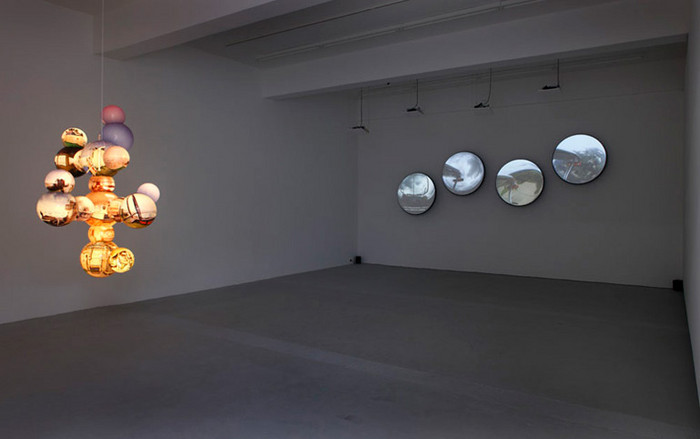Bigert & Bergström
20 Mar - 19 Apr 2008

Installation view If You Don't Like The Weather, Change It
Galerie Barbara Thumm, Berlin, 2008
Image 1 of 5
Galerie Barbara Thumm, Berlin, 2008
Image 1 of 5
Galerie Barbara Thumm, Markgrafenstrasse 68:
Bigert & Bergström
If You Don’t Like the Weather, Change It
20. March – 19. April 2008
Private View on Wednesday, 19. March, 7-9 pm
With their project “Everybody Talks About the Weather, but Nobody Does Anything About It”, 2007, Bigert & Bergström once again enter the realm of scientific research and experimentation. Their focus this time is on influencing meteorological processes.
In the 1990s – e.g. in the walk-in “Climate Chambers” they designed for the Swedish pavilion at the Expo in Lisbon – they subjected the visitors to extreme conditions such as heat, gales, humidity and cold. Now they have become active, undertaking to modify the climate themselves.
In their video “If You Don’t Like the Weather, Change It”, which is projected onto four parabolic surfaces, they explore the human longing to control the weather in interviews with meteorologists, scientists and pilots. On the other hand, they also document their own attempt to shoot holes in a cloud from an airplane.
Man’s manipulation of the weather looks back on a long, primarily military tradition. The artificially augmented rainstorm was employed in the Vietnam war as a weapon “to make mud, not war”; the visibility of targets was improved by dissolving the cloud cover. The psychoanalytical researcher Wilhelm Reich, for his part, attempted to clean the atmosphere and influence the weather as early as the 1950s with the aid of his so-called “Cloudbuster”. As we learn from the pilot with whom Bigert & Bergström embark on their undertaking, the “seeding” of storm clouds – causing them to rain themselves out prematurely – is used these days primarily to avoid major insurance claims on account of hailstorms.
Bigert & Bergström respond to the debate over the inevitable dangers brought about by global warming and the current dramatic climatic events – still nothing more than good old talk about the weather – with their artistic action. Here they have taken it upon themselves to transform the phenomena of the natural world into an artwork by producing “physical nothingness” with the holes they make in the clouds. Even so, however, these climatic changes are not only relevant scenarios, but also real ones – particularly with regard to the ecological catastrophes and their staging in the media and politics. The latter can be taken to such an extreme that, ten years ago, the U.S. Air Force published a paper on the subject with the telling title “Weather as a Force Multiplier: Owning the Weather in 2025”.
In addition to the video projection, the luminous, molecular structure of spherical photographs entitled “Expedition” is also on view.
On the occasion of the exhibition a catalogue on Bigert & Bergström will be released,
featuring an essay by Ronald Jones.
Bigert & Bergström
If You Don’t Like the Weather, Change It
20. March – 19. April 2008
Private View on Wednesday, 19. March, 7-9 pm
With their project “Everybody Talks About the Weather, but Nobody Does Anything About It”, 2007, Bigert & Bergström once again enter the realm of scientific research and experimentation. Their focus this time is on influencing meteorological processes.
In the 1990s – e.g. in the walk-in “Climate Chambers” they designed for the Swedish pavilion at the Expo in Lisbon – they subjected the visitors to extreme conditions such as heat, gales, humidity and cold. Now they have become active, undertaking to modify the climate themselves.
In their video “If You Don’t Like the Weather, Change It”, which is projected onto four parabolic surfaces, they explore the human longing to control the weather in interviews with meteorologists, scientists and pilots. On the other hand, they also document their own attempt to shoot holes in a cloud from an airplane.
Man’s manipulation of the weather looks back on a long, primarily military tradition. The artificially augmented rainstorm was employed in the Vietnam war as a weapon “to make mud, not war”; the visibility of targets was improved by dissolving the cloud cover. The psychoanalytical researcher Wilhelm Reich, for his part, attempted to clean the atmosphere and influence the weather as early as the 1950s with the aid of his so-called “Cloudbuster”. As we learn from the pilot with whom Bigert & Bergström embark on their undertaking, the “seeding” of storm clouds – causing them to rain themselves out prematurely – is used these days primarily to avoid major insurance claims on account of hailstorms.
Bigert & Bergström respond to the debate over the inevitable dangers brought about by global warming and the current dramatic climatic events – still nothing more than good old talk about the weather – with their artistic action. Here they have taken it upon themselves to transform the phenomena of the natural world into an artwork by producing “physical nothingness” with the holes they make in the clouds. Even so, however, these climatic changes are not only relevant scenarios, but also real ones – particularly with regard to the ecological catastrophes and their staging in the media and politics. The latter can be taken to such an extreme that, ten years ago, the U.S. Air Force published a paper on the subject with the telling title “Weather as a Force Multiplier: Owning the Weather in 2025”.
In addition to the video projection, the luminous, molecular structure of spherical photographs entitled “Expedition” is also on view.
On the occasion of the exhibition a catalogue on Bigert & Bergström will be released,
featuring an essay by Ronald Jones.
